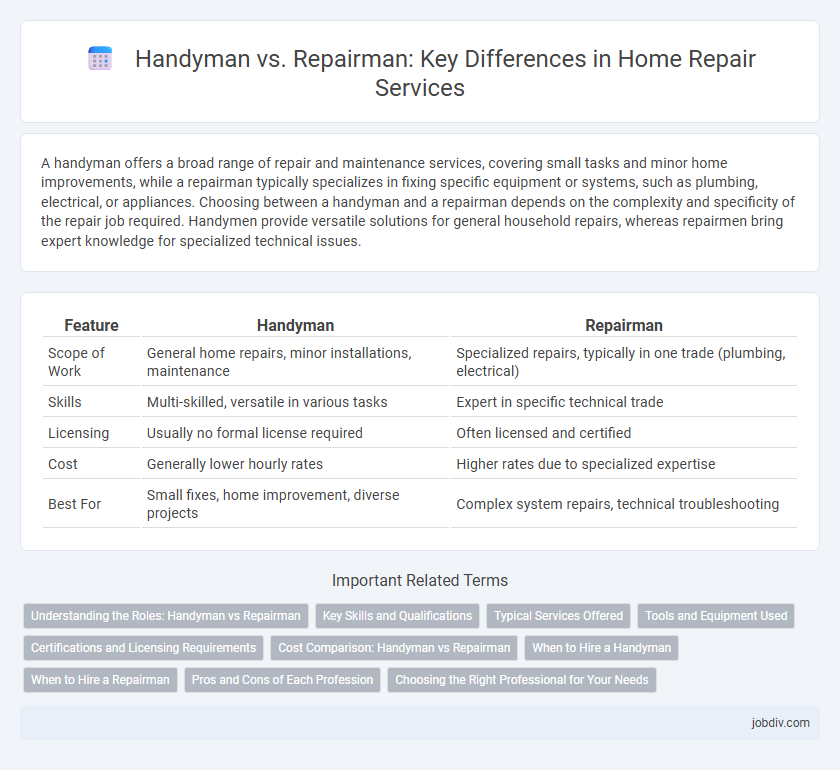A handyman offers a broad range of repair and maintenance services, covering small tasks and minor home improvements, while a repairman typically specializes in fixing specific equipment or systems, such as plumbing, electrical, or appliances. Choosing between a handyman and a repairman depends on the complexity and specificity of the repair job required. Handymen provide versatile solutions for general household repairs, whereas repairmen bring expert knowledge for specialized technical issues.
Table of Comparison
| Feature | Handyman | Repairman |
|---|---|---|
| Scope of Work | General home repairs, minor installations, maintenance | Specialized repairs, typically in one trade (plumbing, electrical) |
| Skills | Multi-skilled, versatile in various tasks | Expert in specific technical trade |
| Licensing | Usually no formal license required | Often licensed and certified |
| Cost | Generally lower hourly rates | Higher rates due to specialized expertise |
| Best For | Small fixes, home improvement, diverse projects | Complex system repairs, technical troubleshooting |
Understanding the Roles: Handyman vs Repairman
A handyman specializes in a wide range of small home maintenance tasks such as fixing leaky faucets, painting walls, and assembling furniture, providing versatile solutions for everyday repairs. A repairman, on the other hand, typically focuses on specific trades like electrical or plumbing repairs, offering expert knowledge and specialized skills for more complex technical issues. Understanding these roles helps homeowners choose the right professional based on the scope and complexity of the repair needed.
Key Skills and Qualifications
Handyman skills typically include a broad range of home maintenance tasks such as plumbing, electrical work, carpentry, and painting, requiring versatility and practical problem-solving abilities. Repairmen often specialize in specific trades like HVAC, appliance repair, or automotive maintenance, demanding in-depth technical knowledge and certifications in their field. Key qualifications for handymen emphasize adaptability and general knowledge, while repairmen must have formal training and industry-specific licenses to ensure precision and safety.
Typical Services Offered
Handyman services typically include minor home repairs, furniture assembly, painting, and small electrical or plumbing tasks. Repairmen focus more on specialized repairs such as HVAC systems, major appliance fixes, and structural issues requiring in-depth technical knowledge. Choosing between a handyman and a repairman depends on the complexity and nature of the repair needed.
Tools and Equipment Used
Handymen typically use a wide range of versatile tools such as cordless drills, multi-bit screwdrivers, and adjustable wrenches to handle various household tasks, while repairmen often specialize in specific equipment like pipe wrenches, voltage testers, or power saws depending on their trade. The choice of tools reflects the breadth of services offered, with handymen favoring portability and adaptability, and repairmen emphasizing precision and durability in their specialized instruments. Efficient use of these tools is essential for timely repairs and maintaining high-quality workmanship.
Certifications and Licensing Requirements
Handymen often perform a wide range of minor repairs and maintenance tasks but typically do not require formal certifications or specialized licenses, depending on local regulations. Repairmen, especially those specializing in specific trades like electrical or plumbing work, are usually required to hold relevant certifications and valid licenses to ensure compliance with safety standards and legal requirements. Licensed repairmen undergo rigorous training and testing to guarantee expertise, whereas handymen may rely more on practical experience and general skills.
Cost Comparison: Handyman vs Repairman
Handyman services typically cost less per hour, averaging between $60 and $90, compared to repairmen who charge $80 to $150 depending on specialization. Handymen handle a wide range of minor repairs and maintenance tasks, making them cost-effective for small jobs, while repairmen are often more expensive due to their expertise in specific systems like plumbing or electrical work. Choosing between a handyman and a repairman depends on the complexity of the task and budget constraints, with handymen offering greater affordability for general repairs.
When to Hire a Handyman
Hire a handyman for small to medium-sized home repairs, maintenance tasks, and minor installations that don't require specialized plumbing or electrical licenses. Tasks like fixing leaky faucets, patching drywall, or assembling furniture are ideal projects for a handyman's versatile skill set. Opt for a handyman when you need quick, cost-effective solutions for multiple small repairs rather than complex, specialized repairs.
When to Hire a Repairman
Hire a repairman when specialized skills are required for complex issues like electrical wiring, plumbing, or HVAC system malfunctions that demand licensed expertise. Repairmen often have certifications and training to ensure compliance with safety regulations and building codes, minimizing risks and potential damages. For routine maintenance or minor fixes, a handyman may suffice, but a repairman is essential for technical repairs to guarantee long-term reliability and safety.
Pros and Cons of Each Profession
Handymen offer versatility with a broad skill set, making them ideal for small home repairs and maintenance tasks, but they may lack specialized knowledge required for complex issues. Repairmen typically possess deep expertise in specific trades such as plumbing or electrical work, ensuring high-quality repairs, though their scope is narrower and may result in higher costs. Choosing between a handyman and a repairman depends on the complexity of the job, budget constraints, and the need for specialized skills or general maintenance.
Choosing the Right Professional for Your Needs
Selecting the right professional depends on the scope of your project; a handyman typically handles small repairs, maintenance tasks, and minor installations across various home areas, while a repairman specializes in fixing specific systems such as plumbing, electrical, or appliances. Understanding the complexity of the issue helps ensure efficiency, budget control, and quality workmanship. Hiring a handyman suits general maintenance and quick fixes, whereas a repairman is essential for technical repairs requiring specialized knowledge or certification.
Handyman vs Repairman Infographic

 jobdiv.com
jobdiv.com